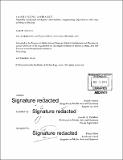Intelligent ambiance : digitally mediated workspace atmosphere, augmenting experiences and supporting wellbeing
Author(s)
Azaria, Asaph
DownloadFull printable version (17.20Mb)
Alternative title
Digitally mediated workspace atmosphere, augmenting experiences and supporting wellbeing
Other Contributors
Program in Media Arts and Sciences (Massachusetts Institute of Technology)
Advisor
Joseph A. Paradiso.
Terms of use
Metadata
Show full item recordAbstract
Cues from the physical environment are constantly sensed and interpreted - unconsciously finding their way into our cognitive schemas and influencing our perceptions and experiences. Manipulating them has been shown to be powerful, affecting cognitive performance, mood and even physiology. Inspired by this, we propose a workspace capable of dynamically transforming its ambiance. This work presents the Digital Cubicle - a cubicle workspace which uses lighting, video projection and sound to manipulate its physical characteristics. A set of software tools is developed to create digital compositions in such a workspace, basing the compositions on objective physical measures from existing popular workspaces. Through a set of user studies, we evaluate how these elicit occupant perceptual, cognitive and physiological responses. Detailed in this work, are physiological responses indicating stress development and restoration, with interesting implications for health and wellbeing applications. We develop a sensor data collection infrastructure to complement the workspace's controllable ambiance, with rich, real-time information about the occupant context and state. Leveraging Reinforcement Learning techniques, we present a framework to devise adaptive control agents. These utilise sensor data to recommend and transform the workspace ambiance in a closed-loop fashion. A prototype intelligent agent is implemented, optimising for occupants' heart rate recovery, yet counterbalancing for occupants preferences and requests. Through evaluative simulations, anchored with real occupant data, we demonstrate and discuss the effectiveness of our proposed approach.
Description
Thesis: S.M., Massachusetts Institute of Technology, School of Architecture and Planning, Program in Media Arts and Sciences, 2016. Cataloged from PDF version of thesis. Includes bibliographical references (pages 117-124).
Date issued
2016Department
Program in Media Arts and Sciences (Massachusetts Institute of Technology)Publisher
Massachusetts Institute of Technology
Keywords
Program in Media Arts and Sciences ()